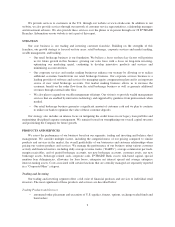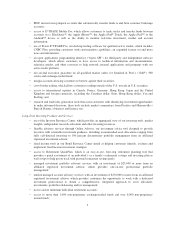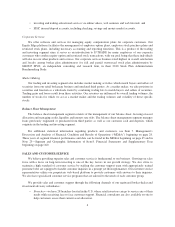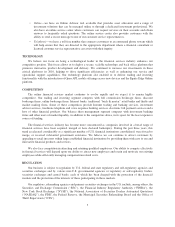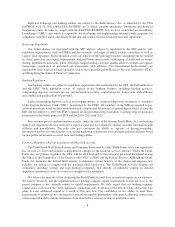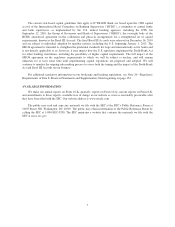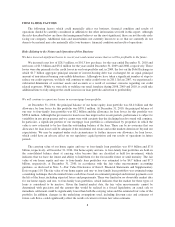eTrade 2010 Annual Report Download - page 15
Download and view the complete annual report
Please find page 15 of the 2010 eTrade annual report below. You can navigate through the pages in the report by either clicking on the pages listed below, or by using the keyword search tool below to find specific information within the annual report.We have acquired a number of businesses and, although we are currently constrained by the terms of our
corporate debt and the memoranda of understanding we and E*TRADE Bank entered into with the OTS, may
continue to acquire businesses in the future. The primary assets of these businesses are their customer accounts.
Our retention of these assets and the customers of businesses we acquire may be impacted by our ability to
successfully continue to integrate the acquired operations, products (including pricing) and personnel. Diversion
of management attention from other business concerns could have a negative impact. If we are not successful in
our integration efforts, we may experience significant attrition in the acquired accounts or experience other issues
that would prevent us from achieving the level of revenue enhancements and cost savings that we expect with
respect to an acquisition.
Risks associated with principal trading transactions could result in trading losses.
A majority of our market making revenues are derived from trading as a principal. We may incur trading
losses relating to the purchase, sale or short sale of securities for our own account, as well as trading losses in our
market maker stocks. We carry equity security positions on a daily basis and from time to time, we may carry
large positions in securities of a single issuer or issuers engaged in a specific industry. Sudden changes in the
value of these positions could impact our financial results.
Reduced spreads in securities pricing, levels of trading activity and trading through market makers could harm
our market maker business.
Technological advances, competition and regulatory changes in the marketplace may continue to tighten
securities spreads. Tighter spreads could reduce revenue capture per share by our market maker, thus reducing
revenues for this line of business.
Advisory services subject us to additional risks.
We provide advisory services to investors to aid them in their decision making and also provide full service
portfolio management. Investment decisions and suggestions are based on publicly available documents and
communications with investors regarding investment preferences and risk tolerances. Publicly available
documents may be inaccurate and misleading, resulting in recommendations or transactions that are inconsistent
with the investors’ intended results. In addition, advisors may not understand investor needs or risk tolerances,
failures that may result in the recommendation or purchase of a portfolio of assets that may not be suitable for the
investor. To the extent that we fail to know our customers or improperly advise them, we could be found liable
for losses suffered by such customers, which could harm our reputation and business.
Our international operations subject us to additional risks and regulation, which could impair our business
growth.
We conduct business in a number of international locations. Action or inaction in any of these operations,
including the failure to follow proper practices with respect to regulatory compliance and/or corporate
governance, could harm our operations and/or our reputation.
We have a significant deferred tax asset and cannot assure it will be fully realized.
We had net deferred tax assets of $1.5 billion as of December 31, 2010. We did not establish a valuation
allowance against our federal net deferred tax assets as of December 31, 2010 as we believe that it is more likely
than not that all of these assets will be realized. In evaluating the need for a valuation allowance, we estimated
future taxable income based on management approved forecasts. This process required significant judgment by
management about matters that are by nature uncertain. If future events differ significantly from our current
forecasts, a valuation allowance may need to be established, which would have a material adverse effect on our
results of operations and our financial condition.
12


